Graham Reid | | 11 min read
The Chills: There is No Point In Trying (from Soft Bomb, 1992)
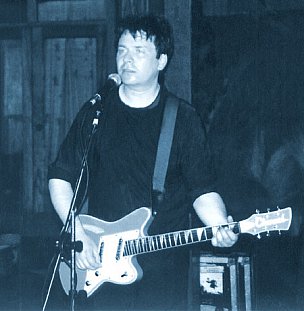
Martin Phillipps looks bad. His skin is pasty, he’s unshaven and his eyes look like an owls in an arc light. He’s been up for 24 hours and although it’s only lunchtime he’s going to hang out until the Iron Maiden concert that night. He’s tired ... though an 18-hour flight from the States does that to anyone. But it’s more than that.
Back there in America only days before, Phillipps has left the corpse of his 12-year dream, the Chills.
He cups the pint of beer he will intermittently sip for the next hour or so and talks of a dream gone sour. Through so many false starts and line-ups, from the chirpy Kaleidoscope World and elemental Pink Frost to the long anticipated heavenly pop hit, the Chills were the great white hope of Kiwi rock, the standard-bearer for the Flying Nun label. But the band whose vision was briefly shared with a nation had now become a joke.
When word came back that the line-up was no more and Phillipps had said, for the first time, it was “the end of the Chills as a concept,” there was more ridicule than sadness or surprise.
All those years, all those members...but, lest we forget, all that great music, too.
Phillipps sits erect in the hard-back chair and explains these recent events with typically quiet and measured intensity. To hear him tell it, this recent, last American tour was one that never took off. There were problems within the band (witnessed by drummer Earl Robertson being offed even before the band left New Zealand and Craig Mason taking his place). Phillipps’s says he felt he was having to drag them to instil energy and spirit within them.
“There always seemed to be another problem to be addressed before the band could really play. They were trying – although at times they weren’t,” he says with clear resolve. “It’s never an easy business and you can make it more difficult for yourself by being -- some would say realistic, I would say negative. I found myself with a group that largely had tendency towards the negative and got bogged down in problems.”
Mason, who played one gig here and four days later found himself a Chill in Seattle, confirms the group “was not very happy” when he joined by understandably bristles at Phillipps’ referring to them as ‘substandard.”
Phillipps regrets his comments appeared “selectively.” But the band was, at times, substandard, he says. And he wasn’t the only one to say it – so did fans, record company people... Especially in the early part of the tour.
He is reluctant to be drawn into the personal dynamics of this last, failed line-up but, as he talks, the bigger picture begins to emerge.
“The energy level the Chills need to live up to our past reputation has to be even higher in the post-Nirvana age where people’s ability to concentrate and comprehend quieter music is reduced.
“Initially we weren’t living up to our past reputation and while most audiences didn’t notice, it wasn’t satisfying for me because it’s a huge expenditure of energy to get up and perform those songs and sink myself into the different frames of mind needed to pull off a really good performance.”
And that admirable but equally notorious singular vision is not one Phillipps has been able to share with many Chills. It wasn’t until the last couple of weeks of this recent tour – “when the end was in sight” – that these Chills reached the heights Phillipps could feel satisfied with.
There is an irony, however, when Phillipps says the band “had an obligation to be the Chills and not play Chills songs like a covers band.”
While he was aware of the market perception that this may have been a lesser version of a band that peaked some years back, within the group everyone (“except me”) was on a wage.
He wonders now if that was such a good idea, but he didn’t want a repeat of the Andrew Todd/Justin Harwood/Caroline Easther line-up of ’86-’87 who gave so much of themselves yet received so little in return. Paying a wage seemed a better way.
“And there’s no reason it couldn’t have worked with those people and been a much better Chills than it was. They were being paid good money to play great music. I just can’t see why it couldn’t work.”
Phillips has a blind spot he finds hard to acknowledge. He concedes his own performances “go up and down – but I’m always trying my best” without accepting readily that others may also be trying equally hard. It was their job; they should try, he says.
Where the Chills ultimately lost it all was their fifth gig, according to journalist Dean Goodman who saw a number of shows on the tour. It was the big one at the Roxy Theatre on Sunset Strip before important industry people from Warners, the company that picked up the band from its Slash subsidiary and sank something in big six-figure American dollars into this band from somewhere called New Zealand.
On the night, expensive equipment failed, the revamped stage isolated Phillipps out the front, according to bassist Terry Moore, and they never even looked like a band.
“I walked off stage,” says Phillipps, “and said to our tour manager the ramifications of this would be very serious. I felt I was battling fate again and there’s only so much you can do. Sometimes the gods aren’t on your side when it counts...”
He says that fate had reversed the fortune it had shown when a previously great gig at the New Music Seminar in New York got the Chills an American deal in the first place.
But from the Roxy on September 15 there was a steady, relentless slide, even if the shows got better and they touched the magic. 
In the absence of another heavenly pop hit, the Soft Bomb album they were touring sank amid mixed reviews, the Male Monster from the Id video received only intermittent MTV play, the single withered and audiences – down at all concerts in the States – stayed home when the Chills played.
By the time journalist Goodman caught up with the band in Nashville, they were playing across town from a B52s/Violet Femmes double bill to a mere 33 people.
What Phillipps knew – but hadn’t told the band, according to Moore and Mason – was that they had ceased to be a priority for Warners and the groundwork wasn’t being done in advance of their dates. Without that essential support Europe was off; he still would have gone had he had it, he says.
Essentially the Chills were history and Phillipps, doubtless, depressed, told Goodman: “It’s been tried and we’ve failed, basically. From the industry’s point of view, we’ve been definitely tried and tested but been found wanting.”
It was on stage in New York that Phillipps announced it would be the last time anyone would see the Chills.
“It was news to me,” say both Moore and Mason, still fuming.
“Martin doesn’t have enough empathy for the people he works with,” says bassist Moore, who has worked closely with Phillips through the band’s 12-year career. “Paying people this time meant he felt he didn’t have to communicate (about the business) anymore. We were left hanging all the time and were getting very pissed off.”
The European dates cancelled, there was little else to do but watch the curtain drop on the dream.
And it has always been Martin Phillipps’ singular dream.
Chris Knox will tell of a young Phillipps watching Toy Love shows with glazed-eyed passion, ex-Chills down the years all speak of Phillipps being “very much in a world of his own, “ and the gifted pop craftsman himself still speaks of an unswerving passion on this day when the dream lies in ashes at his feet.
“The Chills make music for music lovers and followers of a calibre of music that may not even exist as a market anymore,” he says. “The Chills‘ quest to some extent has been to reach those people who are huge music fans but have been disappointed at the way music is going and the vacuousness of it.”
But the body count of ex-Chills suggests the vision is difficult to share. Put it to Phillipps that being a Chill in the Nineties and having to hear about previously great line-ups or gigs might get a little grating and he deflects the question.
It doesn’t matter if perfection isn’t reached night after night; you just have to strive for it and be aware it exists. It’s not a matter of line-ups but the potential for the songs, he insists.
Oh, and he knows what people are saying, he says wearily.
“That it’s too much a personal vision for me. But I’ve been very happy with so many of the line-ups. Perhaps my search for perfection can be wearying, but once they [the other Chills] have been there where it has really worked, you’d think they’d want to achieve that night after night.
“I take my music intensely and personally and expected others to do the same. Chills’ music is very fragile and depends on everyone being in a particular frame of mind. I spot it instantly on stage if someone is not feeling...chipper,” he says, laughing for the first time and taking a sip from his virtually untouched glass.
While he may say now he over-compensates by putting on a stronger personal performance to inspire the band, that isn’t confirmed by many ex-Chills. Their reading is not that they had to hear about previous greatness – but that they didn’t hear from Phillipps at all. Just no communication.
Phillipps may with justification claim the Chills had a great live reputation and that he was “considered among the better songwriters on the planet,” but what is equally true is his reputation for being difficult to work with.
“I don’t think I am, I really don’t. I know a lot of others far more difficult. My difficulty is people get frustrated by not understanding what I’m trying to get out. Communicating about music isn’t easy – there’s only so much you can say.
“There’s nothing much I can do about my reputation except hope some of the other band members will eventually feel strong enough to stand up and say it wasn’t that bad.”
So, stand up, some ex-Chills.
“Martin was very difficult to communicate with, particularly on a musical level,” says 18-month Chill drummer Caroline Easther. “You would sense something was wrong because he’d leave a song out of a set but would never discuss why. I’ve nothing but respect for him, but he was very hard to work with. I felt we were on different wavelengths.”
Moore – and bassist Justin Harwood – both say Phillipps frequently didn’t respect those he worked with and seldom acknowledged the contributions they made to the realisation of the Phillipps dream.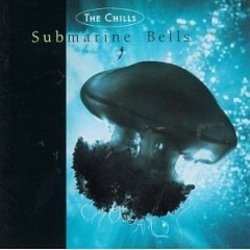
“I respect Martin as a songwriter and performer,” says Moore from New York, “although on stage he was very much into himself and not always aware of what was going on. And he ran the band very badly.
“We all came together looking forward to the tour, but Martin creates such an atmosphere that people’s respect for him disappears. There were no arguments...just nothing at all from Martin. So there were bad vibes and people would be complaining to each other because Martin was so hard to approach.”
Easther says there was never time for the line-up she was in to get to know each other socially, a sentiment echoed by Moore.
Some will be relieved the Chills is over, Phillipps says, because they’d always thought it was his solo project ... but not so. He is frustrated he cannot find others who will feel comfortable being a Chill and find joy in contributing to the whole. His strength is not in being a solo performer but in shaping the sound of a band. But now he has lost all faith in his ability to pick people.
For not the first time, he mentions fate. You meet someone in a pub and they share your love of the same music – “that’s how my favourite groups have formed.”
“I constantly mention the group in interviews but it gets edited out because it’s not newsworthy. I constantly try to disperse attention,” he says.
At one point Phillipps mentions a band which contains an uncomfortable precedent for his situation now ... The Left Banke, a 60s band who scored a major hit with Walk Away Renee, written by singer Michael Brown when he was 16.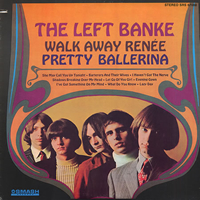
Brown – rather like Phillipps – had The Vision and brought together harpsichord and a string section in the rock context. He quit Left Banke in ’69 after giving them the equally sublime Pretty Ballerina, then virtually disappeared into cult bands the Stories, the Beckies ... and who knows where today.
“Brown was considered a pop genius by some, overrated and unpredictable by others,” is the assessment in the Penguin Encyclopaedia of Popular Music.
Phillipps – pop genius or overrated – ponders an uncertain future but, with a weak smile, admits the situation is laughable.
But...
“I’m looking at the very real possibility I may not have a record company or have access to making records. What I’ve achieved may not actually be relevant.”
And Phillipps’ achievements are not inconsiderable. His reputation as a gifted songwriter is well earned. He is a pop craftsman who counts among his peers and friends Peter Holsapple (who works with R.E.M.) and onetime Brian Wilson/’Beach Boys string arranger Van Dyke Parks. He has been capable of blinding pop genius, whether it be in the eerie ambience of Pink Frost or the sophisticated accomplishment of Water Wolves on Soft Bomb.
He can’t be too specific but mentions a personal debt that sounds like a fairly hefty mortgage ... the sum spent by Slash/Warners on the Chills has all the ring of a split first prize in Lotto ... bankruptcy is a word he mentions ... a debt more than he has earned in the past five years ... he’s at an age when he should be having a mid-life crises but thought he’d avoided that by establishing something ... but he left school and put all his eggs in one basket ... music was his life ...
“I did away with my education and it’s a bit late for me to be starting something when everybody is unemployed and I can’t afford to pay my way through university.
“I’m going to have to believe my song writing is the only way out ... but how is it going to reach people now?”
But he talks, too, of the weight being off ... the responsibility of others gone now ... financial problems so big they are unreal ... he’ll join the film society in Dunedin, where he is headed ... he has short story ideas in the notebook he keeps ... a horror film story is in there too (“Is it called The Chills?” “Could be actually,” he smiles grimly) ... he’s keen to start painting again...
He flashes a smile through tired eyes. It all sounds like that Spinal Tap thing, he laughs. “Saucy Jack...”
Martin Phillipps, a man who know so much music, may have to sell off his record collection ...
Any way you look at it – “difficult” or not – it’s tragic.
“I’ve spent so much time getting this bloody band together,” he says without irony.
Ideally someone would record his songs, he’d get some money, buy a house and build a home studio, start writing ...
“That’s my dream. But it does seem crazy that at 29 the only personal space I have on this planet is a little shed out the back of my parents’ house. Most careers give you something back ...
“It doesn’t seem fair, given the amount of work...”

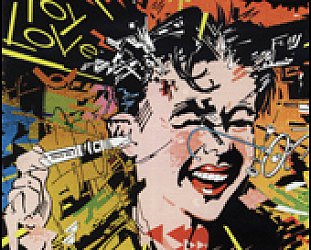
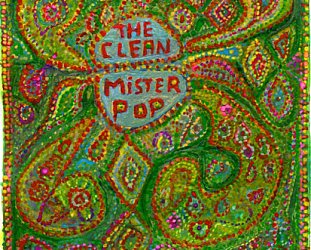

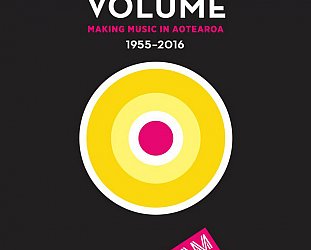
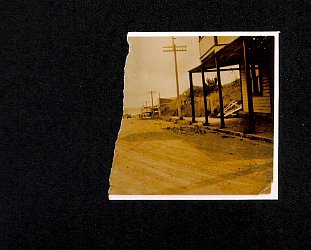
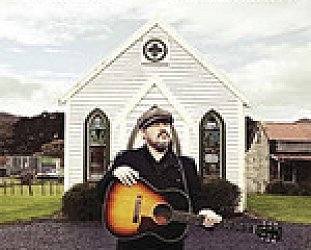
post a comment